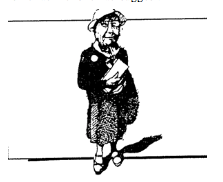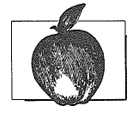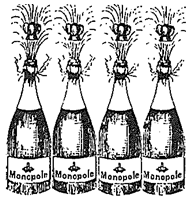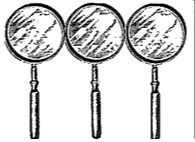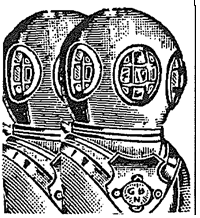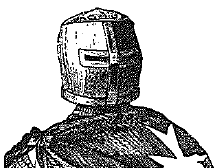Charles Murray: Losing Ground: American Social Policy, 1950-1980; Basic Books; New York. Charles Murray’s book is a study of some of the biggest, and perhaps the least excusable, social problems facing American society. Losing Ground is based on a mass of data, and its message is clear and unmistakable: the benevolent social policies adopted in the 1960’s have...
Category: Bookshelves
Cold Pricklies & Warm Fuzzies
Joyce Carol Oates: Last Days; E. P. Dutton; New York. Joseph Campos-De Metro: The Slugger Heart & Other Stories; Harcourt Brace Jovanovich; San Diego. At 47, Joyce Carol Oates has to her credit more than 40 books, including 16 rather fat novels and nearly as many collections of not-so-short stories. Ms. Oates is also, however, one of this country’s...
Turning Left at Valhalla
Wagnerism in European Culture and Politics; Edited by David C. Large and William Weber; Cornell University Press; Ithaca. “We recently had a very serious conversation on the subject of Richard Wagner,” Debussy once remarked to Pierre Louys. “I merely stated that Wagner was the greatest man who ever existed, and went no further. I didn’t say that...
Life by Teaspoonsful
Peter Handke: The Weight of the World; Translated by Ralph Man heim; Farrar, Straus & Giroux; New York. This combination of writer’s notebook and personal diary by the German novelist, playwright, poet, film writer and director Peter Handke is 243 pages of random perceptions, most of them just a few lines long. They were written between November 1975 and...
Fast-Living Frump
Barbara Pym: A Very Private Eye: An Autobiography in Diaries and Letters; Edited by Hazel Holt and Hilary Pym; E. P. Dutton; New York; $19.95. “Be more wicked, if necessary,” Barbara Pym’s agent once suggested as she revised her early novels and prepared to make her first wild dash through the gauntlet of London publishers. “Can you imagine an old spinster,”...
Troubled New Women
Megan Marshall: The Cost of Loving: Women and the New Fear of Intimacy; G. P. Putnam’s Sons; New York; $14.95. Megan Marshall’s book attests to the resiliency of nature and common sense in human affairs. The Cost of Loving is a chapter in the rise and fall of the feminist ideology. Feminism, like many ideologies, had (Marshall uses the past tense) the characteristics...
Short Day’s Journey Into Night
Martin Gottfried: Jed Harris: The Curse of Genius; Little, Brown; Boston. The man who called himself Jed Harris was the leading producer and director of the Broadway of the 20’s and 30’s. The staccato pacing of Broadway (1926) won him instant attention and a place on the cover of Time magazine. It turned the American...
Canned Heat
Ernest van den Haag: Smashing Liberal Icons: A Collection of Debates; The Heritage Foundation; Washington, DC. When the adversaries are aggressive and the topics provocative, debates are stimulating entertainment. And, too, many vigorous minds have shared Samuel Johnson’s relish for “talking for victory.” But for participant and auditor alike, the excitement is in being there—in the tones...
Commendables – Schools for Scandal
Herbert I. London: Why Are They Lying to Our Children?; Stein and Day; New York. The title of Herbert London’s book is an all-too-accurate description of the textbooks used to “educate” American students, Why Are They Lying to Our Children? is a brief and closely reasoned exploration of the “faddist and trendy character of these books,...
Commendables – Troubled Sleep
Mary Wollstonecraft Shelley: Frankenstein: Or, the Modern Prometheus; University of California; Berkeley. In the more than 165 years since Mary Shelley wrote her Gothic tale, Victor Frankenstein and his monster have become an enduring symbol of the modern mind. She was only a girl of 18 when her adolescent nightmares curdled into the murky tale...
Commendables – Last Rites
Mary Douglas: Purity and Danger: An Analysis of the Concepts of Pollution and Taboo; Ark/Routledge & Kegan Paul; London. The history of most religions can be written as a struggle between High and Low Church. There is always a tension between those who adhere to ritual and tradition and those who seek salvation only from...
In Focus – Say A Little Prayer
George Goldberg; Reconstructing America; Wm. B. Eedernabs; Grand Rapids, MI. Many years ago Leo Strauss remarked that the Supreme Court is more likely to defer to the contentions of social science than to the Ten Commandments as the words of the living God. Strauss was, of course, basing his observation on the use of social...
In Focus – Embattled Preacher
Dinesh D’Souza: Falwell, Before the Millennium; Regnery Gateway; Chicago. The Rev. Jerry Falwell is one of the most frequently pilloried men in America today. Journalists and liberal politicians are fond of comparing him to Hitler, Khomeini, and Jim Jones and brand him a “racist,” “fascist,” and “intolerant bigot.” Ultrafundamentalists like Bob Jones denounce him as...
In Focus – Media Quislings
James L. Tyson: Target America: The Influence of Communist Propaganda on the U.S. Media; Regnery Gateway; Chicago. Most Americans understand that “news” from Tass is about as reliable as promises from real-estate speculators. Both are capable of paving swampland with hyperbole. What relatively few of us realize, however, is to what extent American news reports are swayed...
Waste of Money – Duo-Tone
G. Cabrera Infante: Infante’s Inferno; Harper & Row; New York. A wire service photo run in some U.S. newspapers prior to the November “elections” in Nicaragua featured an image that is both familiar and disorienting. The setting: a campaign rally in Managua for Sandinista presidential candidate Daniel Ortega. The center of focus: a young girl,...
In Focus – God and Men at Hillsdale
The Christian Vision: Man in Society; Edited by Lynne Morris; The Hillsdale College Press; Hillsdale, MI. “Where there is no vision,” says Proverbs, “the people perish.” Because the vision provided by Judeo-Christianity has been fading for some time on America’s campuses, college graduates informed by a sense of purpose and meaning have become rare. As...
Waste of Money – Marketing 101
Jean-Claude Courdy: The Japanese: Everyday Life in teh Empire of the Rising Sun; Harper & Row; New York. Matthew Perry sailed into Tokyo Bay in 1853. President Fillmore was interested in putting an end to Japan’s isolation policy. Commodore Perry stuck around the harbor until the empire agreed to open trade negotiations. A trade agreement...
Waste of Money – Canonizing Eleanor
J. William T. Youngs: Eleanor Roosevelt: A Personal and Public Life; Little, Brown; Boston. No First Lady in this century has so fully captured the American imagination as Eleanor Roosevelt–only Jacqueline Kennedy has even come close. During the dark hours of the Depression and World War II, Eleanor became a symbol of hope for millions...
Waste of Money – Reinventing the Universe
Philosophy and Science Fiction; Edited by Michael Philips; Prometheus Books; Buffalo, NY. It is not exactlv a new idea to consider the philosoplical dimensions of science fiction. This anthology, which seems designed for one of Prof. Philips’s freshman survey courses, contains a few good, if obvious, selections from Stanislaw Lem, Borges, and Karel Capek in...
Foreign Fiascoes
Endless Enemies: The Making of an Unfriendly World by Jonathan Kwitny; Congdon & Weed, New York. During the formative years of the American republic, Alexander Hamilton proposed that a national debt would be beneficial since it would tie the wealthy, the lenders, to the fledgling government, the debtor. Hamilton doubtless would regard a trillion-dollar national...
Putting Down Uncle Pat
The Persistent Prejudice: Anti-Catholicism in the U.S. by Michael Schwartz; Our Sunday Visitor Press, Huntington, IN. Catholicism is so pervasive in America that it is taken for granted as somehow normal. Schwartz traces hostility to Catholicism from its Reformation roots in England, where it was identified with “foreigners” and political conspiracy. Transplanted to the New...
Required Reading
Required Writing: Miscellaneous Pieces 1955-1982 by Philip Larkin; Farrar Strauss Giroux, New York. Philip Larkin is a rare thing among literary journalists—his own man. When he edited the Oxford Book of Twentieth Century Verse, he filled it with his own eccentric choices, many of them rhymed and often by uncelebrated poets. His own verse, as...
Success by Association
Gertrude Stein may be the only official member of “The Lost Generation” who has not been disemboweled by literary analysts. Stein’s circle-biographer James R. Mellow called it a “Charmed Circle” in the title of his 1974 book was not restricted to Hemingway, Sherwood Anderson, and other literati. Gertie, as she was known to some of...
Useless Idiots
The History and Impact of Marxist-Leninist Organizational Theory: “Useful Idiots,” “Innocents’ Clubs,” and “Transmission Belts” by John P. Roche; Institute for Foreign Policy Analysis, Cambridge, MA. The joke is as old as Marxism in power: Lenin (or Stalin or Khrushchev or Chernenko) shows his beautiful Crimean villa, his fleet of limousines, his army of servants,...
In Focus – Dead Soul
John M. Allegro: The Dead Sea Scrolls and the Christian Myth; Prometheus; Buffalo, N.Y. John M. Allegro has distinguished himself as an editor and commentator of the Dead Sea Scrolls. Unfortunately, his erudition did not prevent him from writing a very foolish book. Allegro believes that the resemblance between the Scrolls and certain Christian practices...
Perceptibles (Part 2)
Herbert Kohl: Growing Minds: On Becoming a Teacher; Harper &Row; New York. The author of The Open Class Room offers some progressive advice on the craft of teaching. Much of his argument is cast in the form of a personal memoir. To parents of school-age children, the history of Kohl’s teaching career will read more like a...
Commendables – Of Devotion and Democracy
Richard John Neuhaus: The Naked Piblic Square: Religion and Democracy; William B. Eerdmans; Grand Rapids, MI. The worst thing about the wonderful but secondary and nonsalvific blessings of Christianity is that once those who enjoy the divine bestowals have forgotten their source, these blessings are set up as objects of new and destructive forms of...
Commendables – Of Bullets & Ballots
Morris Janowitz: The Reconstruction of Patriotism: Education for Civic Conscoiusness; University of Chicago Press; Chicago. In some ways nothing seems more un-American than military life. The hierarchic authority, the strict discipline, the regimentation of appearance and manner all appear antithetical to the modern American notion of individual rights. However, in Tbe Reconstruction of Patriotism Morris...
Perceptibles (Part 1)
Zbigniew Lewicki: The Bang and the Whimper: Apocalypse and Entropy in American Literature; Greenwood Press; Westport, CT. Every instant, each of us moves closer to the End. It may be a result of “the big one,”or it could simply be that our biological software program has run its functions. Every instant there is more disorder....
In Focus – The Public Climate
Jim Harrison: Sundog; E. P. Dutton/Seymour Lawrence; New York. There are actually two Michigans. They are unimaginatively known as the “Lower” and “Upper” peninsulas. The latter is often designated the “U.P.” In states that have a single major metropolis, there’s usually that city and what’s left: e.g., Chicago and the Rest. In Michigan, it’s Detroit...
In Focus – In Focus
Ronald Blythe: Characters and Their Landscapes; Harcourt Brace Jovanovich; San Diego. Central though it is to any sound system of economics, the traditional notion of private property is wholly inadequate in the world of literature. As Henry David Thoreau once observed: I have frequently seen a poet withdraw, having enjoyed the most valuable part of...
Notables – Bathos
In a full page ad in The New York Tinzes Book Review for Sex & Destiny: Tbe Politics of Human Fertility by Germaine Greer (Harper & Row; New York) a certain Fay Weldon’s words from a piece in the London Times are quoted in type that’s 1/2-inch high: “One of the most important books to be...
In Focus – Courting Catastrophe
Scott Donaldson: Fool for Love, F. Scott Fitzgerald; Congdon & Weed; New York. Love, popular culture endlessly reminds us, makes the world go round. But since the cultural sphere now seems to be wobbling erratically in its orbit, a sensible observer might suspect that something is amiss in this rotary force. As citations in the...
Perceptibles (Part 3)
Malcolm Bradbury: The Modern American Novel; Oxford University Press; New York. Serviceable handbooks to literature are always handy to have around the house or office; those that are pithy rather than prolix are even superior. Malcolm Bradbury, himself no mean novelist, examines, in a mere 186 pages (excluding back-of-the-book materials), American fiction from the 1890’s...
Waste of Money – Canonized for Confusion
Red Emma Speaks: An Emma Goldman Reader; Edited by Alix Kates Shulman; Schocken Books; New York. In science fields, creating a false paradigm is a sure way to gain disrepute among posterity. The modern reputations, for instance, of Ptolemy as an astronomer, or of Tycho Brahe as a cosmologist are not high. In politics, however,...
Waste of Money – Lower Life Forms
Joe Haldeman: Worlds Apart; Vikings Press; New York. It’s widely reported that in the event of a nuclear holocaust, the highly adaptive life form known by the sobriquet “cockroach” will inherit the remains. Joe Haldeman, in this science fiction sludge, posits a variation on this theme: the order Blattaria, in 2085, will include bipedal creatures...
Commendables – Of Prose and Piety
James J. Thompson, Jr.: Christian Classics Revisited; Ignatius; San Franciso. Among the ends to which writers may put their words is that of leading the reader toward the divine Word of Christian belief. In the secularized world of modernity, such efforts, even when practiced with subtlety, insight, and creative intelligence receive remarkably little attention, however....
In Focus – Semitrivial Pursuits
Roger Scruton: Kant; Oxford University Press; New York. Peter Singer: Hegel; Oxford University Press; New York. J. O. Urmson: Berkeley; Oxford University Press; New York. Michael Howard: Clausewitz; Oxford University Press; New York. Peter France: Diderot; Oxford University Press; New York. Peter Stansky: William Morris; Oxford University Press; New York. While most things liberal tend to be...
In Focus – Pieces
Max Apple: Free Agents; Harper & Row; New York. Picture a man. About fivc eight-and-a-half in height, wire rimmed glasses, curly hair, salt-and-pepper beard, blue brushed-cotton shirt, loose navy tie, khaki pants, and Top Siders. Picture him in two dimensions–as if he is a life-sized cartoon, like a Lichtenstein. Once the image is fixed, imagine...
In Focus – The Babes in Books
Reinhard Kuhn: Corruption in Paradise: The Child in Western Literature; Boston University Press/University Press of New England; Hanover, NH. Presumably, since every adult was once a child, all adults should understand childhood. Somehow, however, the child remains a profound mystery to anyone who has left childhood. Trying to wrest understanding and utilitarian control out of that...
Perceptibles (Part 1)
Cay Van Ash: Ten Years Beyond Baker Street; Harper & Row, New York. In 1929, when producer David O. Selznick was still young enough to be designated a “Wunderkind,” he came up with an idea for a story that could be a part of a movie revue called Paramount on Parade. As he wrote in...
Perceptibles (part 2)
Richard Morris: Dismantling the Universe: The Nature of Scientific Discovery; Simon & Schuster; New York. In “The Love Song of J. Alfred Prufrock” Eliot’s title character asks, or muses, at one point, “Do I dare/Disturb the universe?” That question is but one of many in the poem; it is not, then, unlike the two found in one...
Waste of Money – On the Trail of E.T.
George A. Seielstad: Cosmic Ecology: The View from the Outside In; University of California Press, Berkeley. Gerald S. Hawkins: Mindsteps to the Cosmos; Harper & Row; New York. When astronaut Bruce McCandless moved outside of the space shuttle Challenger last February and slowly (relatively speaking, that is) moved away from the ship sans umbilical cord, it was...
Commendables – Strategies & Schemes
Peter Hutchinson: Games Authors Play; Methuen; New York. During a conversation with Jorge Luis Borges at the Ingersoll Prizes ceremony in Chicago last December, we were informed that, in his estimation, “Literature is supposed to be enjoyed.” He added, “It is fun, is it not?” There was what can only be described as a whimsical...
Waste of Money – One Step Behind
George Johnson: Architects of Fear: Conspiracy Theories and Paranoia in American Politics; Jeremy P. Tarcher; Los Angeles. Before the world became a smaller place as a result of communications and transportation webs, apocryphal tales about magical and mystical powers emanating from sages in Africa and the Orient permeated the nooks and crannies of civilized environments....
Initiate Abroad
A Little Tour in France by Henry James; Farrar, Straus & Giroux; New York Mark Twain was so disgusted by the superficial and sentimental nonsense in most American travel books that he said he wanted to eat “a tourist for breakfast.” But instead of devouring American tourists he delightfully caricatured their bungling stupidity, their romantic...
Rara Avis in Terris
The Prevalence of Humbug and Other Essays by Max Black; Cornell University Press; Ithaca, NY. One of the moderately interesting—and ultimately most annoying—things that one can do with a home computer is to put it into a GOTO loop. That is, a program is a series of steps. To make a loop, the final instruction...
Onwords and Backwords
Worstword Ho by Samuel Beckett; Grove Press; New York. The Twofold Vibration by Raymond Federman; Indiana University Press; Boomington. Beckett continues. While there has been a sense of ending from the beginning, the pauses, as he nears 80, seem . . . felt, not studied. Genuine. The words emerge, repeat, proliferate, press onward, enjamb, stall,...
Of Communists and Convicts
House of Slammers by Nathan Heard; Macmillan; New York. “It was only when I lay there on rotting prison straw that I sensed within myself the first stirrings of good.” So wrote Aleksandr Solzhenitsyn in “The Soul and Barbed Wire” about his experience in the Soviet Gulag. Like most inmates in the communist penal system,...
Prolitkrit
Literary Theory: An Introduction by Terry Eagleton; University of Minnesota Press; Minneapolis. To put Mr. Eagleton in the proper light, one might borrow a quotation from his own Walter Benjamin; or, Towards a Revolutionary Criticism (1981): Let us review some of the names of the major Marxist aestheticians of the century to date: Lukacs, Goldmann,...
